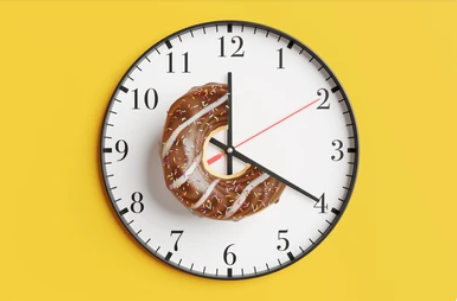What you eat is important, no question. But what about when
you eat? We shine a light on how the timing of your meals can affect your
health.
The time of the day you eat most of your food can affect
your weight, appetite, chronic disease risk and your body’s ability to burn and
store fat.
It is called “chrononutrition”, and it is an emerging area
of research that looks at how the timing of your meals affects your circadian
rhythm.

Do not eat too much, too late
People whose largest meal is in the evening may be heavier
and have bigger blood fats and blood sugar after eating, found a 2020 review of
studies published the Journal of Neurochemistry.
But before you get too alarmed, this does not mean you have
to skip dinner or go to bed hungry.
“Nothing bad is going to happen if you eat a balanced dinner
earlier in the evening, or have a small protein-rich snack to quell hunger
pangs before you go to bed,” says dietitian Abby Langer.
“Your body knows what to do with the food you consume in the
dark, trust me.”
Alan Flanagan, author of the 2020 study, agrees, saying it
is more about thinking about total energy distribution throughout the whole
day.
“In people with impaired glucose control [higher than normal
blood sugar levels] the evidence is overwhelmingly in favour of greater
distribution of total daily energy earlier in the days,” he says.
“When over 35 per cent of energy comes later in the day,
that’s pretty consistently associated with increased BMI, body fat percentage,
and cardiometabolic risk, in particular diabetes risk.”
Other studies from 2022 supported these conclusions,
finding:
- People were significantly
hungrier than they had a late-eating compared to early-eating schedule.
- Later eating caused people to
burn less fat and fewer calories, and pushed their fat cells to store more fat.
- Earlier eaters had greater
improvements in their blood sugar, cholesterol levels and insulin sensitivity
(a marker of diabetes risk) and lost more weight than later eaters.
Making it work for you
It is not practical for many of us to eat our largest meal
in the morning, so how can you optimise your health without too much
disruption?
- Do not skip breakfast. This does
not mean you have to eat as soon as you get up, but try to eat the majority of
your calories during the morning and afternoon.
- Aim to eat dinner earlier in the
evening. Avoid sitting down at 10pm to eat. Instead, if you are a late eater,
start by moving your meal at least one hour earlier than usual, aiming to eat
dinner no later than two to three hours before bed.
- Lighten the load. Make dinner a
meal that is chock full of vegetables rather than carbohydrates, and switch to
eating most of your carbs (bread, pasta etc) to earlier in the day when you are
more sensitive to insulin. You will still gain benefits even if you can only do
this for four or five days a week.